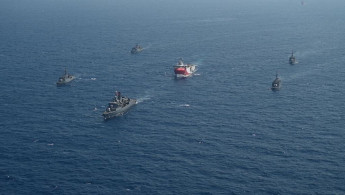Turkey extends gas exploration in Mediterranean crisis
Turkey on Thursday extended its controversial Mediterranean gas exploration mission and scheduled new navy drills as its row with Greece and the EU over energy and borders threatened to spiral out of control.
The Turkish navy said it was prolonging the stay of the Oruc Reis research vessel and its accompanying warships in waters claimed by Greece by an extra five days to Tuesday.
It also announced plans to hold "gunnery exercises" at the edge of its territorial waters in the northeastern corner of the Mediterranean next Tuesday and Wednesday.
Defence Minister Hulusi Akar said the shoopting drills were not related to Turkey's fight with Greece over access to newly discovered reserves that could offer Europe a vast new source of energy and cut its dependence on Russia.
But he also defiantly vowed to continue Turkey's various exploration activities in the east Mediterranean region for "as long as they are needed".
"We are determined to protect our rights," the Turkish defence minister said.
The two NATO members have been staging rival war games in a conflict that could imperil Europe's access to vast new energy deposits and further destabilise war-torn Libya and parts of the Middle East.
An increasingly agitated Germany said ahead of an EU foreign ministers' meeting on the crisis in Berlin that both countries had to end their naval manuevers if they really wanted a peaceful solution to the dispute.
"The preconditions for (direct negotiations) are that these manoeuvres in the eastern Mediterranean are stopped," German Foreign Minister Heiko Maas said after completing a failed round of diplomacy in Athens and Ankara this week.
Trump gets involved
US President Donald Trump also spoke to Greek Prime Minister Kyriakos Mitsotakis and Turkish President Recep Tayyip Erdogan on Wednesday -- his first direct involvement in the fast-developing crisis.
The White House said Trump "expressed concern over increased tension between NATO allies Greece and Turkey".
The Greek prime minister said afterwords that Athens was "ready for a significant de-escalation -- but on condition that Turkey immediately stops its provocative actions".
Erdogan has already rejected agreeing to preconditions before talking to Greece.
The Turkish presidency said Erdogan "reminded (Trump) our country was not the one creating instability in the eastern Mediterranean".
Erdogan "emphasised how Turkey has taken concrete steps which proves it sides with lowering tensions and dialogue," the presidency said.
Greece's European support is led by EU military powerhouse France.
French frigates and fighter jets joined the Greek war games -- also including Italy and Crete -- on Wednesday while Turkey staged smaller ones nearby with a US navy ship.
The French intervention has particularly upset Turkey.
"The time for bullying is over. You have no chance to force (us) to take some actions through bullying," Akar told France in a televised interview.
"It's an empty dream to think about preventing or changing the activities of Turkey or the Turkish armed forces," he said of the French military presence in the region.
Akar also urged Greece to stop hiding behind France or the EU and said: "As Turkey and the Greeks, we need to solve our problems by holding talks... We say we should talk, we say dialogue and want a solution."
The EU meanwhile appears divided over how to respond.
Greece's push to sanction Turkey failed to get off the ground at an EU foreign ministers' video conference on August 14.
Turkey's position found some support from southern European countries that would be most directly affected should Erdogan retaliate against the bloc.
Greece is expected to try again at the EU meeting in Berlin on Thursday and Friday.
Follow us on Facebook, Twitter and Instagram to stay connected





 Follow the Middle East's top stories in English at The New Arab on Google News
Follow the Middle East's top stories in English at The New Arab on Google News


